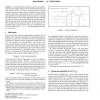Free Online Productivity Tools
i2Speak
i2Symbol
i2OCR
iTex2Img
iWeb2Print
iWeb2Shot
i2Type
iPdf2Split
iPdf2Merge
i2Bopomofo
i2Arabic
i2Style
i2Image
i2PDF
iLatex2Rtf
Sci2ools
121
click to vote
ECAI
1998
Springer
1998
Springer
Description Logics with Concrete Domains and Aggregation
Abstract. We extend different Description Logics by concrete domains (such as integers and reals) and by aggregation functions over these domains (such as min;max;count;sum), which are usually available in database systems. On the one hand, we show that this extension may lead to undecidability of the basic inference problems satisfiability and subsumption. This is true even for a very small Description Logic and very simple aggregation functions, provided that universal value restrictions are present. On the other hand, disallowing universal value restrictions yields decidability of satisfiability, provided that the concrete domain is not too expressive. An example of such a concrete domain is the set of (nonnegative) integers with comparisons (=, , n, ...) and the aggregation functions min;max;count. 1 Motivation Unlike many other expressive representation formalisms, such as database schema and query languages, basic Description Logic formalisms (e.g., ALC [12]) do not allow for bui...
Related Content
| Added | 24 Aug 2010 |
| Updated | 24 Aug 2010 |
| Type | Conference |
| Year | 1998 |
| Where | ECAI |
| Authors | Franz Baader, Ulrike Sattler |
Comments (0)

